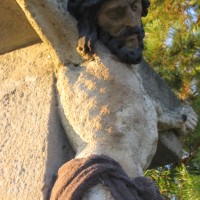Have you ever grieved for members of your family who had every opportunity to live well and yet they took all their resources and squandered them? Maybe a wayward child to whom you gave an education and great parenting, providing a good example and maybe even a religious upbringing? But being autonomous, that person chose to turn his/her back on everything and go along a path toward ruin?
 Then you know how Paul felt. He had a broken heart for Israel.
Then you know how Paul felt. He had a broken heart for Israel.
They were his people. He knew how much they had been given:
Theirs is the adoption as sons; theirs the divine glory, the covenants, the receiving of the law, the temple worship and the promises. Theirs are the patriarchs, and from them is traced the human ancestry of Christ (Romans 9:4-5, NIV)
They had it all and yet, they rejected the Messiah who was the holy seed—the stump God left in the land—after the exile (Isaiah 6:13). Their Messiah came and they didn’t even recognize Him.
So Paul–who as recently as the Road to Damascus had been in the same place of rejecting and persecuting Christ–grieves. Paul grieves and desperately wants his people to wake up! To see their Messiah has come! To reap the full benefit of all the gifts of their past by embracing their Messiah now! They can have it all!
Speaking to the Roman church which must have had cause to interact with significant numbers of believing and non-believing Jews, Paul now draws a parallel out of the Books of Moses for encouragement. In the Torah, Abraham fathered two sons: Ishmael (the firstborn son), and Isaac, the child of promise. Israel would identify with Isaac and would hopefully see that faith in what God alone can do (i.e. accomplish His will of redemption), is what matters. To have a legacy but no future is to be Ishmael. To have the legacy and faith in the promise is to have it all. This is what it means to be a spiritual type of Isaac. This is what Paul wants for Israel.
Paul sees so many of his brothers and sisters who have it all in the past, yet are living now without a future and that is why Paul has a broken heart for Israel.
* * *
Give it up for Lent: Glory days in the past with no future
* * *
For further study:
- Read the account of Abraham’s two sons in Genesis chapters 15-16 and 21. God was gracious in fulfilling His promise to Abraham and still blessed Ishmael even though he was not the child of promise. What did God demonstrate regarding faith?
- What legacy might you be relying upon instead of recognizing the Messiah?
- Do you know any Jewish people? Pray for them today that they might have it all—the promises made to Israel and their Messiah.
 Recently, I traveled on a domestic flight out of Chicago O’Hare airport. With “the sequester” in progress in the US, we thought we’d be standing in long lines for airport security. Surprisingly, there was hardly any wait at all.
Recently, I traveled on a domestic flight out of Chicago O’Hare airport. With “the sequester” in progress in the US, we thought we’d be standing in long lines for airport security. Surprisingly, there was hardly any wait at all. Hope sustains us between our first believing until we possess it fully. Paul tells us that we do not hope for what we already hold in our hands. Once hope has been realized, it’s no longer hope.
Hope sustains us between our first believing until we possess it fully. Paul tells us that we do not hope for what we already hold in our hands. Once hope has been realized, it’s no longer hope. OK, I’ll admit it: I struggle with “the environmentalist movement.” On one hand, I try to be a good steward of the environment, have been a frugal consumer and was a cautious recycler long before it was fashionable. I am a trained horticulturist and have a deep and abiding love of nature. On the other hand, I don’t want to lead people to believe that we can “save the planet.” Heck, we can’t even save ourselves!
OK, I’ll admit it: I struggle with “the environmentalist movement.” On one hand, I try to be a good steward of the environment, have been a frugal consumer and was a cautious recycler long before it was fashionable. I am a trained horticulturist and have a deep and abiding love of nature. On the other hand, I don’t want to lead people to believe that we can “save the planet.” Heck, we can’t even save ourselves! The Holy Spirit is, in my view, the best kept secret of evangelical Christianity. Whether it’s out of our fear of being perceived as too charismatic, or that He goes by the name Holy Ghost and this seems remarkably unscientific, or maybe just that we can’t see the spiritual, we treat the Holy Spirit like the member of the Trinity who truly embarrasses us. Not me! I love the Holy Spirit and today’s passage (
The Holy Spirit is, in my view, the best kept secret of evangelical Christianity. Whether it’s out of our fear of being perceived as too charismatic, or that He goes by the name Holy Ghost and this seems remarkably unscientific, or maybe just that we can’t see the spiritual, we treat the Holy Spirit like the member of the Trinity who truly embarrasses us. Not me! I love the Holy Spirit and today’s passage (



